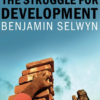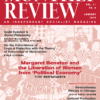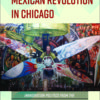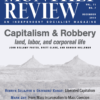
Marx and the Indigenous
The “turn toward the indigenous” in social theory in the last couple of decades, associated with the critique of white settler colonialism, has reintroduced themes long present in Marxian theory, but in ways that are often surprisingly divorced from Karl Marx’s critique of capitalism, colonialism, and imperialism. | more…

Messianic Zionism
The relation between Zionism and Judaism (the Jewish religion) is paradoxical and complex. In its early days, Zionism was apparently a thoroughly secular political movement. In reality, while its ego was secular, its id has always been religious. And in recent times, the latter has emerged from its hidden recess and is parading in full view. | more…

Sex and Socialism
While later generations of Marxian scientific socialists saw sex as secondary, derivative of the real relationships of production, many of the earliest socialist theorists and movements took sexual matters very seriously. Thus, in many ways, the advent of Marxian socialism represented something of a step backward in the development of a radical sexual politics. However, in the twentieth century, old divisions on the sex question within the left soon reappeared. | more…

The Case for Labor-Led Development
As Benjamin Selwyn points out in his sharp and thoughtful The Struggle for Development, capital-centered development deepens exploitation. Selwyn powerfully challenges the capitalist road to further immiseration for the majority of the world’s population, opening up an important discussion regarding what is to be done in the twenty-first century. An alternative form of development, led by the laboring classes, is not only necessary but possible. Above all, “labouring-class movements and struggles against capitalist exploitation can be, and are, developmental in and of themselves.” | more…

The Life of José Carlos Mariátegui
Mike Gonzalez’s new biography of JosŽ Carlos Mari‡tegui is an important attempt to introduce the Peruvian socialist to an English-speaking audience. It constitutes not so much a rediscovery of Mari‡tegui, but is itself part of a slow but steady embrace of a novel and innovative thinker broadly credited with the creation of a Latin American Marxism. | more…

January 2020 (Volume 71, Number 8)
The coup against the Bolivian government under Evo Morales came straight out of the latest political-military manuals of the U.S. imperial state. These manuals provide instructions on how systematically to undermine the reputation of a popular, elected leader with accusations of dictatorship, corruption, and various other forms of character assassination in order to soften support on the left. Moreover, these manuals provide step-by-step instructions on how to prepare the political and military bases of a coup. | more…

Liberating Women from “Political Economy”
There is an unresolved tension at the heart of Marxist explanations for women’s oppression under capitalism. Although there is general agreement that the bourgeois family, as the dominant kinship unit, has something to do with generating and reproducing that oppression, the exact role of the family varies among Marxists. In this respect, Margaret Benston’s proposal to situate domestic labor within capitalist production was truly pioneering. Rather than record and describe domestic work, Benston theorized this labor and laid the basis for later feminists to apprehend the production of commodities and the reproduction of labor power within a unitary framework. | more…

Evald Ilyenkov and Soviet Philosophy
Vesa Oittinen interviews Andrey Maidansky about Soviet philosophy and the well-known and controversial Soviet philosopher Evald Ilyenkov (1924–79). | more…

On the Coincidence of Logic with Dialectics and the Theory of Knowledge of Materialism
In this reprint of “On the Coincidence of Logic with Dialectics and the Theory of Knowledge of Materialism,” Evald Ilyenkov discusses the idea of the coincidence of dialectics, logics, and theory of knowledge—one of the hallmarks of the Ilyenkovian current in post-Stalin Soviet philosophy. Ilyenkov was a renowned and controversial Soviet Marxist philosopher who contributed substantially to the Marx Renaissance that emerged in the so-called Thaw Period, aiming to reconstruct Marx’s original methodology. He was known as an ardent critic of technocratic tendencies in the Soviet Union and stressed that socialist society should express humanist values and not merely be an engineering project. | more…

Revolutionary Mexico in Chicago
In The Mexican Revolution in Chicago: Immigration Politics from the Early Twentieth Century to the Cold War, John H. Flores illustrates the growth of the Mexican population in 1920s Chicago and how migrant communities situated and organized themselves politically in an often-hostile social environment. Drawing from political experiences in Mexico, Flores identifies and explores the evolution of a Mexican population whose identities and loyalties were shaped and divided by the Mexican revolutionary and counterrevolutionary processes in la patria (the homeland). | more…

Interrogating the Cultural Production of Mexico
As part of a deconstruction of national identity, Jennifer Jolly, in her Creating Pátzcuaro, Creating Mexico: Art, Tourism, and Nation Building under Lázaro Cárdenas, analyzes the tourist town of Pátzcuaro in the west-central Mexican state of Michoacán as a microcosm of cultural power in which tourism, art, history, and ethnicity were woven together under the presidency of Lázaro Cárdenas del Río (1934–40). | more…

The Wisdom of a Socialist Defector
Victor Grossman’s A Socialist Defector: From Harvard to Karl-Marx-Allee is at once an exciting adventure story, an engaging autobiography of a radical opponent of U.S. imperialism, and a clear-headed assessment of the successes and failures of the German Democratic Republic (GDR, East Germany) at the onset of the Cold War until 1990, when its citizens voted to merge with the Federal Republic of Germany (FRG, West Germany). Most poignantly, Grossman compares the benefits workers gained in the GDR, the FRG, and even the United States during the Cold War. | more…

December 2019 (Volume 71, Number 7)
Bloomberg insists that we need to get our priorities straight: the economy comes before the earth, capitalism before nature. Yet, from any sort of realistic, world-wise perspective, it is clear that we are faced with two immense, imminent, and irreversible crises, one threatening within as short a time as a year to destabilize the world capitalist economy, the other promising to destroy the planet as a home to humanity, destabilizing industrial civilization and undermining the survival chances of hundreds of millions or even billions of people this century. Both represent the culmination of capitalist contradictions over centuries of development and both point to the need to transform society in revolutionary ways. It is the coevolution of economic and ecological contradictions under global monopoly-finance capital that defines the epochal historical crisis of our times. In this new issue of Monthly Review, we also celebrate Monthly Review‘s relationship with the annual School of Ecology in Mauritius. | more…